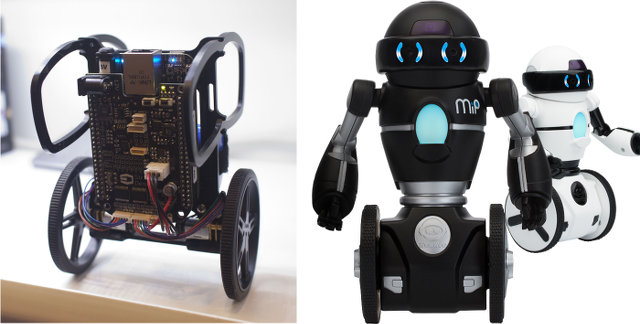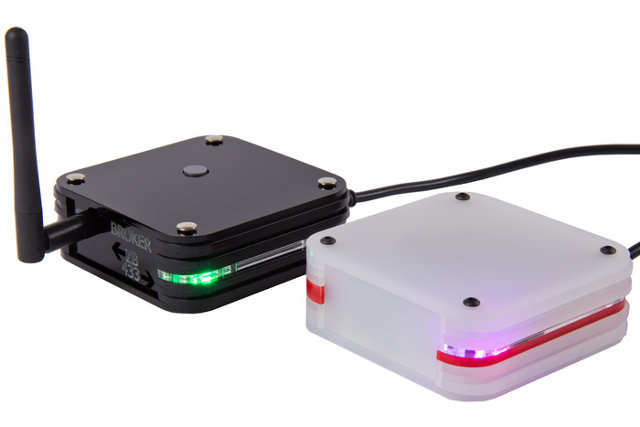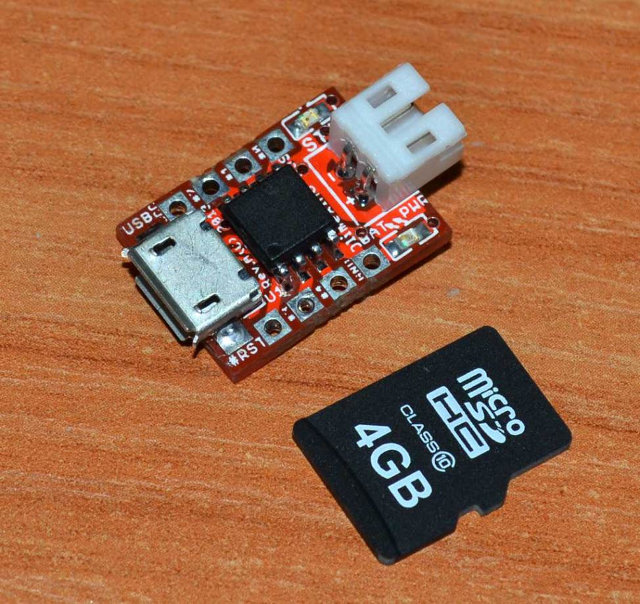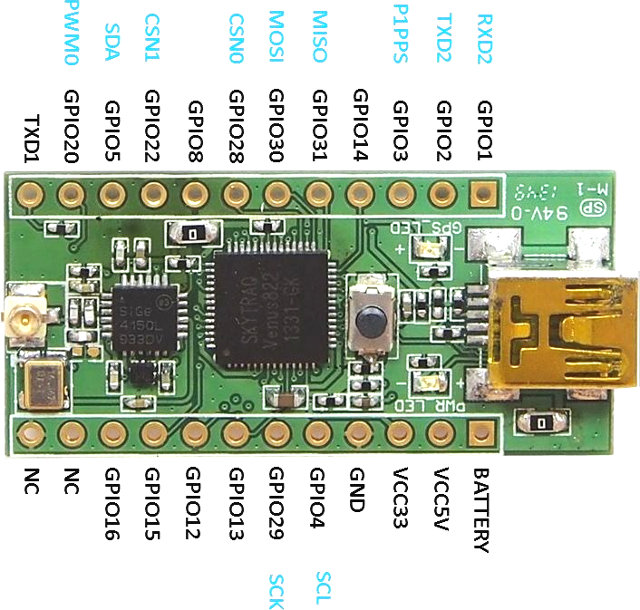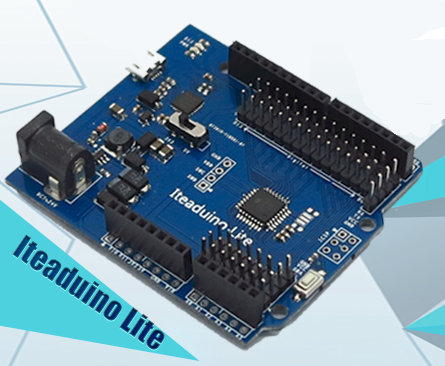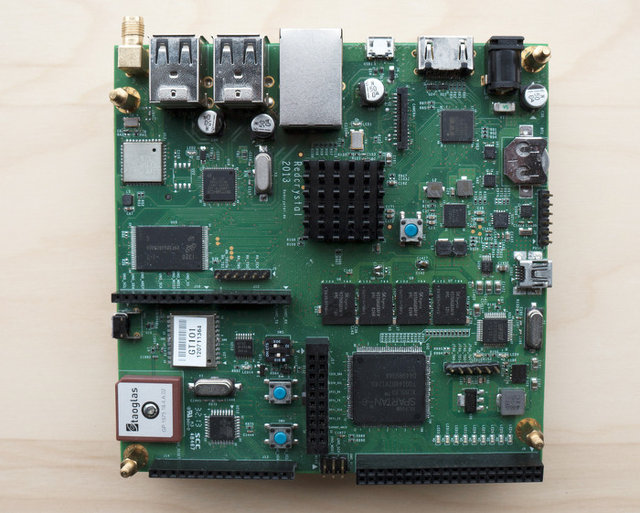Lots of Android TV Boxes and HDMI dongles have hit the market last year, and low cost home automation systems have been launched, or are in development, such as Ninja Sphere. Webee Boss combines both to make your TV and your Home smart, as part of the Webee home automation platform, also composed of “Bees” (Smart Plug, Smart Lamp Holder, Smart Host, Presence Tag, Open/Closed sensors, etc…), Hive m3 development board, and an Android app. Webee Boss specifications: SoC – ARM Cortex A9 Microprocessor @ 800MHz System Memory – 1 GB RAM Storage – 2 GB NAND Flash, micro SD card slot up to 32GB Connectivity 10/100M Ethernet 802.11 b/g/n WiFi IEEE 802.15.4 – ZigBee. Mesh networking. Home Automation profile. Z-Wave. Mesh networking. Home Automation standards compatible in most countries. Wireless Range – Outdoor: 45 to 90 meters, Indoor 45 – 60 meters Video Output – HDMI 1.3 (up to […]
The Open Source Robots Invasion Has Begun: BeagleMiP, uARM, and PiddyBot
In the last few days, I’ve come across three affordable open source robots either based on BeagleBone Black, or Arduino compatible boards, and I’m sure there are many other projects out there for people interested in getting started with robotics without breaking the bank. BeagleMiP Self-balancing Robot I’ve found out the first robots from a long armdevices.net video showing two Mobile Inverted Pendulum (MiP) robots, able to stand on two wheels, designed by the Coordinated Robotics Lab of The University of California, San Diego: BeagleMiP educational robotics development kit from Strawson Design. The kit features the BeagleBone Black board with Texas Instruments Sitara ARM Cortex A8 processor and Novus Robotics Cape, an add-on board that provides 9-axis IMU (Accelerometer, Gyro, Magnetometer), 6 PWM connectors to power servos or brushless ESCs, 2 user-accessible buttons and 2 LEDs, a cell balancer & overvoltage protector, H-bridges to drive 6 DC Motors, and connectors […]
Crowdfunding Report 2013 on CNXSoft Blog
Crowdfunding has really took off in 2013, with sites like Kickstarter and Indiegogo, as they enable start-ups to launch new and innovative products, and some established, even large companies, I’m thinking Canonical with Ubuntu Edge here, have also tapped into that market, actually shifting part of the risks from shareholders, to customers / individual funders. In this post, I’ll go through all the crowdfunding projects, 16 Indiegogo and 25 Kickstarter campaigns, featured on cnx-software.com between the beginning of December 2012 till the end of November 2013, to find out which ones have been a stellar success in terms of funding and on-time delivery, and those that have failed in one way or another, with some being close to looking like scams. There was a wide range of products with dealing home automation, the Internet of things, wireless Arduino compatible boards, Linux development boards, media players and more. Let’s go straight […]
SliceCase is a Modular & Customizable Case for Arduino, Raspberry Pi, and Soon More (Crowdfunding)
When you design hardware around Arduino or Raspberry Pi boards, most likely that not, the enclosures available on the market won’t be usable with your project, and you’ll have to design your own which may end up not quite looking as nice as you expected. Two Hornets, a startup based in the Netherlands, is trying to provide a solution with SliceCase, a modular and customizable casing system, that at first looks similar to some other enclosures like Pimoroni PiBow case. But there’s more than meets the eye, as SliceCase is composed of standard components, that allow you to build the casing around your hardware, and even order custom top covers and sides online. At first, they’ll focus on the most popular boards such as Arduino Standard and Mega boards, and the Raspberry Pi, but if this concept takes off more boards will be added. The enclosure system is composed of […]
OLIMEXINO-85S Arduino Compatible Board is About the Size of a micro SD Card
Several Arduino boards have been designed to be as small as possible this year, including Microduino (25.40 x 27.94mm) and OLIMEXINO-NANO (30 x 30 mm). But Olimex has gone a step further, or should I say smaller, with OLIMEXINO-85S that just a little bit bigger than a micro SD card at 16.9 x 12.7 mm, and may currently claim the title of the smallest Arduino compatible board ever. A board that tiny comes with pretty short specifications: MCU – Atmel ATTiny85 @ 20MHz with 8 KB Flash, and 512B RAM. Misc – two LEDs one for power supply and one user programmable I/O – All 6 I/O pins (I2C, SPI, up to 4 ADC), as well as power pins, available via through holes Power – Via USB micro connector or by LiPo battery The board will be programmable by the Arduino IDE made by Digispark. OLIMEXINO-85S will be available at […]
$15 and Up NavSpark is a tiny GPS / GNSS Arduino Software Compatible Board (Crowdfunding)
[Update: I’ve been told the project is actually launched by SkyTraq. But later, after Indiegogo perks are shipped, they expect to have our customer NAVIN handle later orders and manufacturing, the non-engineering development side of things. Updated post accordingly] Navin, a Taiwanese start-up specialized in location products, SkyTraq, a fabless semiconductor company, which develops GPS chipset for consumer navigation and tracking applications, has recently launched an Indiegogo campaign for NavSpark, their low cost GPS / GNSS board with a 32-bit LEON3 SPARC V8 MCU that can be programmed with the Arduino IDE. Two other models are available: NavSpark-BD for GPS/Beidou, and NavSpark-GL for GPS/GLONASS. NavSpark NavSpark specifications: GSP Receiver – SkyTraq Venus 822 LEON3 Sparc-V8 MCU @ 100MHz with IEEE-754 Compliant FPU, 1024KB Flash Memory, 212KB RAM. GPS – quad-GNSS engine capable of handling 34 GPS / GLONASS/ Beidou / Galileo signals in parallel I/Os – 1x full duplex asynchronous […]
Iteaduino Lite is an $8 Arduino (Mostly) Compatible Board (Crowdfunding)
A few months ago, Borderless Electronics sold a $12 Arduino Leonardo clone ($9 + $3 shipping), and a Chinese company called Itead Studio, which also makes Iteauino Plus board (AllWinner A10), has just launched an Indiegogo campaign for an $8 Arduino “nearly-fully-compatible” board, and yes, that includes shipping. The board is similar to Arduino UNO, but with a different MCU in order to reduce costs: MCU – Logic Green LGT8F88A @ 16MHz with 8KB flash (0.7KB used by bootloader), 1KB SRAM, and 504 byte EEPROM. Operating Voltage – 5V / 3.3V Input Voltage – Recommended: 7-20V, Limits: 7-24V Digital I/O – 14 pins of which 6 provide PWM output. Analog Input – 6 pins DC Current per I/O – Pin80 mA DC Current for 3.3V – power supply 250 mA USB – microUSB for power, programming and debugging Arduino Uno is based on Atmel ATmega328, but this baord uses LFT8F88A, […]
Crystal Board Combines Rockchip RK3188 ARM SoC with Xilinx FPGA and Arduino Compatible Board (Crowdfunding)
Red Crystal, a German startup, has just introduced the Crystal Board, a 3-in-1 development board with Rockchip RK3188 SoC running Linux or Android, an Arduino UNO compatible board, and a Xilinx Spartan-6 FPGA. The concept is a similar to the UDOO board, but adds an FPGA. The company has launched a Kickstarter campaign to gather funds to manufacture the Lite and Pro versions of the board for respectively $149 and $179. Crystal Board specifications (Lite and Pro versions): SoC – Rockchip RK3188 ARM Cortex-A9 quad core up to 1.8Ghz + Mali-400 MP4 GPU MCU – Atmel Atmega328 SMD FPGA – Xilinx Spartan6 XC6SLX9 with 9152 logic cells System Memory – 2GB DDR3 @ 1066MHz (1GB DDR3 @ 1066MHz for Lite version) Storage – micro SD card slot, SPI flash Video Output – HDMI 1.4 Connectivity: 10/100M Ethernet port Wi-Fi 802.11b/g/n with antenna. Dual band for Pro version, 2.4GHz band for […]



